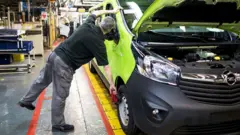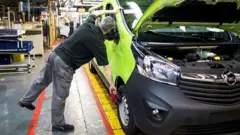Stellantis, the owner of Vauxhall, has announced plans to close its van-making factory in Luton, putting approximately 1,100 jobs at risk. The decision, expected to take effect in spring 2025, follows the company’s strategy to consolidate electric van production at its Ellesmere Port plant in Cheshire.
Background and Impact
The Luton factory, which has been producing petrol and diesel vans, was set to begin manufacturing electric vans from 2025. However, Stellantis has decided to transfer this production to Ellesmere Port, which will receive a £50 million investment. The company claims this move will lead to “greater production efficiency.”
The decision has been met with criticism from union representatives. Unite has described the move as a “complete slap in the face” for its members working in Luton. The union has pledged to support its members and is fighting to maintain historical vehicle manufacturing in Luton.
Industry Context and Government Response
The closure announcement comes amid growing concerns within the automotive industry regarding electric vehicle (EV) sales targets. Many manufacturers, including Stellantis, have been calling for government intervention to boost consumer demand for EVs. In response to the Luton plant announcement and industry pressure, Business Secretary Jonathan Reynolds has stated that the government will consult on changes to the zero-emission vehicles mandate, citing that the current rules are not working as intended.
The Society of Motor Manufacturers and Traders (SMMT) has warned that weak demand for EVs and strict sales quotas could cost carmakers £6 billion in 2024 alone, potentially jeopardizing business viability and jobs. SMMT Chief Executive Mike Hawes emphasized the need for “workable regulation backed with incentives” to support the industry’s transition to electric vehicles.
Future Plans and Reactions
Stellantis plans to create hundreds of permanent jobs at Ellesmere Port and will offer relocation assistance to workers from Luton who wish to transfer. The company invested £100 million in revamping the Ellesmere Port site three years ago to produce electric vehicles.
The closure of the Luton factory marks a significant change in the UK automotive landscape. The plant, which opened in 1905, has a long history of vehicle manufacturing, having employed up to 37,000 people at its peak. While the transition to electric vehicles continues, industry stakeholders are advocating for government support to ensure a smooth and sustainable shift.





